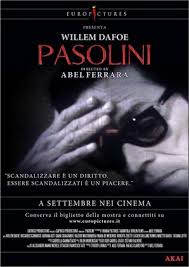
PASOLINI
Italy, 2014, 80 minutes, Colour.
Willem Dafoe, Ninetto Davoli, Raccardo Scarmaccio, Adrian Asti, Maria de Medeiros.
Directed by Abel Ferrara.
For audiences expecting some kind of conspiracy theory about the life and death of novelist, poet, filmmaker, Pier Paolo Pasolini, this is not the film. There have been other films and many a documentary speculating on the political interventions that caused the death of the famed director. Here, Abel Ferrara sees his film as an “unconspiracy”.
While the film traces the last day of Pasolini’s life, it ranges well into the past, has clips from some of his work, especially from Salo and readings from his essays and novels as well as a dramatising of his novel and a character who is his alter ego.
William Dafoe portrays the director, an interesting performance, sometimes using English, sometimes using Italian – and the characters in the film moving from one language to another, though it is basically in Italian.
There is the ordinary life of Pasolini, at home with his mother, the meals, reading, discussions with film people, friends. There is also a sense of realism about his homosexual orientation, his personal behaviour, his alter ego picking up young men, a focus on the kind of young men who are rent boys, leading to the murder of Pasolini on the beach at Ostia.
In the film, playing a significant role of a guide, is the actor, Ninetto Davoli, who appeared in so many of Pasolini’s films and was one of his companions in real life.
The film requires closer attention than usual because of its moving from one style to another, from realism to imagination and story, to an emphasis on dialogue and reading of texts to personal interactions.
One might see it as an interesting contribution to the continuing discussions about Pasolini, his outspokenness, his criticism of government and Italian culture and society, his writings, his films and his significance in Italy in the 1960s and 1970s.
1. Audience knowledge of Pasolini? As a writer, novelist, poet, film director? His political stances? As a person? His homosexuality?
2. Abel Ferrara and his career? Small budget American films? The dark side? His Italian background, sensibilities? This film as an Italian production with European money?
3. Pasolini’s death, speculation, conspiracy theories, political background, the bashing of homosexuals? This film as ‘unconspiracy’? The director not being interested in how or why Pasolini was killed, simply lamenting the fact that the world had lost a genius?
4. The visual style, the sequences from Salo, impressionistic, light and dark, realism and fantasy, the use of close-ups – in the Pasolini style? The camera movements and editing?
5. The musical score, Italian, classical music, modern music, the Missa Luba?
6. The range of the screenplay, the portrait of Pasolini, as an interpretation, the use of his verbal texts, the scenes from Salo and the issues of politics and sex? Quotes from Pasolini, his novels? The visualising of his novel, its relationship to him, and his narration? The behaviour of his alter ego, with the young man on the outskirts of Rome? Going to the discussion about the narrative? The narrative, the story of the crash and its visualising? The relevant fantasy, the star of the Messiah, memories of the Gospel according to St Matthew? The naturalism, the ordinariness of the scenes of Pasolini’s home, his mother, secretary, reading the paper, work? At the trattoria, the young man, the meal? His death? The camera circling, returning to his dead body? The aftermath at home, with two men following the star – and the cynical response?
7. Willem Dafoe as Pasolini, his appearance, gaunt, the glasses? The scenes from Salo, the interview, his work as a director? Speaking French, Italian, in English and his American accent?
8. The issue of homosexuality, his orientation, his alter ego and the encounter and sexual behaviour with the men? The casting of Ninetto Davoli, part of Pasolini’s life and films? Nunzio and Epifanio, the character of Nunzio being performed by the Ninetto Davoli character? Searching for the star, the guards and there eyeing each other sexually, the orgy of gay and lesbians and procreation, the world of the rent boys, the experience, the bashing of homosexuals?
9. The realism, the interviews, at home, the meals, waking in the morning, love for his mother, the secretary and the appointments, the visit of Laura, the rent boys, the end?
10. The issue of narrative and the relationship to the narrator, the alter ego, listening, the story of the plane, its crash?
11. The meal with the couple, Davoli, the mother, Pasolini and the baby?
12. The fantasy with it be Epifanio and Nunzio, Ninetto Davoli and his history, the journey, the star, the guards, the sexual looks, the guide, going into the
orgy, the star appearing from the fireworks, following the star, the narration that there was no paradise, no end, the couple, Epifanio looking back at the earth, understanding the earth, the value of the journey in the search, nothing to do but wait?
13. An impressionistic look at the last day of Pasolini’s life, his activities, his imagination, the grief of his mother, the secretary and Laura – and looking at
the date in his diary for the day of his death?
14. Insights? Impressions?